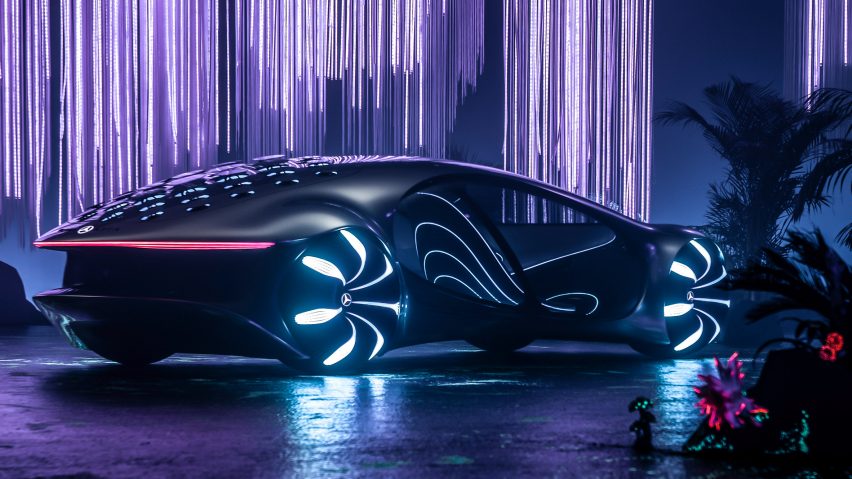This week on Dezeen, automotive giants took their futuristic concept cars for a spin at the 2020 Consumer Electronics Show (CES).
Mercedes-Benz took the sci-fi route, unveiling a vehicle inspired by the world of James Cameron's Avatar movie, in which nature and technology co-exist in harmony.
Made to resemble a living creature, the Vision AVTR has scales on its back that can convey vital information about its surroundings to the driver, while the car's front and rear axles allow it to move sideways "like a crab".
Meanwhile Hyundai and Uber unveiled a concept for a flying car and air-taxi service that could alleviate congestion in our cities, and electronics company Sony made its inaugural venture into car design with a prototype for a driverless electric vehicle.
Beyond concept cars, CES also played host to a range of technologies aimed at improving domestic life, including a bin that seals and changes its own rubbish bags, as well as an AI-powered robot called Ballie.
Inspired by the BB-8 android in the Star Wars movies, this "personal assistant" is capable of rolling around the house and fulfilling everyday tasks like waking up its owner or helping them work out.
Danish architecture studio BIG took CES as an opportunity to unveil its design for a prototype city of the future, which is set to start construction near Mount Fuji in Japan in 2021.
The 70-hectare Woven City development will be tested by 2,000 pioneer residents and include smart homes, robotics and Toyota autonomous vehicles, all synchronised through data and sensors to "power human connectivity".
Elsewhere, BIG also unveiled its masterplan for a redevelopment of Downtown Brooklyn, whose public space is set to be given a colourful overhauled with the help of new and improved sidewalks, sculptural street furniture and plenty of greenery.
In other news, more than 100 Australian architects have responded to the country's bush fire crisis by offering their design services pro-bono to those who have been affected.
With almost 2,000 homes damaged in the blaze, the initiative hopes to help people "rebuild their lives" and replace what was lost to the flames.
Over in the US, Virgin Trains announced that construction is expected to commence on its high-speed rail service this year, connecting Southern California with Las Vegas in Nevada.
If approved by the US Federal Railroad Administration, the fully electric Brightline will transport passengers between the two states in less than 90 minutes.
In New York, construction is set to restart on Santiago Calatrava's Greek Orthodox Church after a two-year money-related hiatus, with an opening date estimated for September 2021.
Located at site of the World Trade Center, the development will replace a church that was destroyed by the buildings' collapse on 9/11.
In interiors, Dezeen columnist Michelle Ogundehin looked ahead to predict the trends that will dominate 2020, from a return to monochrome to plus-size soft furnishings and the rise and rise of sustainable design.
Among the other most-read stories this week was a garden room with translucent white walls, IBM's more sustainable alternative to lithium-ion batteries and an architectural concept for a Cyberhouse to compliment Tesla's controversial Cybertruck.

